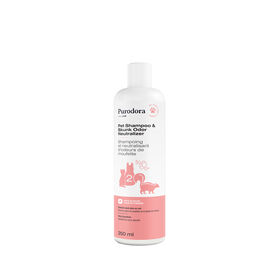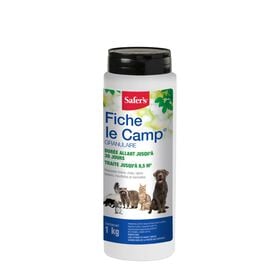It’s 11pm on Tuesday night. Doggy has just gone outside to pee. Suddenly, you hear a noise in the yard and immediately run out to call him in. What is this awful stench inching closer and closer? Could it be a…skunk?!
If you find yourself in this situation, the first thing to do is to give Doggy a quick and immediate examination, preferably outside — weather permitting. Are his eyes red, or half-closed? Is he sneezing or salivating uncontrollably? Scratching in certain areas?

What to do when your pet’s been sprayed by a skunk?
The first you’ll want to do is to wash him with plenty of water in order to remove the urine from the skin, which is the cause of the irritation. Exercise caution if you notice any on their head.
- Rinse his head, holding it downward so as to prevent him from swallowing and choking.
- Rinse his eyes with a saline solution if you happen to have some in the house (it is less irritating); if not, continue delicately with water.
- Rinse the rest of the body.
Emergency at-home remedy!
Forget all about tomato juice — it doesn’t work! This technique fails to remove the skunk’s putrid urine particles and therefore only conceals the odour instead of cleaning it out.
If you don’t have a product to eliminate skunk odour, try this trusted household concoction:
- 1 litre of 3% hydrogen peroxide
- ¼ cup of baking soda
- 2 soup spoons of dish soap (“Sunlight” brand, if possible)
- Add water as necessary

Apply the solution, taking care to avoid the eyes, and rub deeply. Let it work its magic for at least five minutes and then rinse thoroughly. Repeat as needed. Check out our tips for cleaning your pet's eyes, ears and nose properly.
The combination of the peroxide with the baking soda oxidizes the molecules responsible for the bad smell, killing them, and rendering this solution a highly effective one. Note that bubbles should appear when the solution is applied, meaning it cannot be prepared in advance.
Specialized products
There are a number of products which are specially designed to combat the skunk’s nasty smell, such as odour-diminishing sprays that can be applied before the animal enters the house. Once you’ve employed one of these products, it’s off to the bathroom! You’ll find a number of shampoos in animal care stores and veterinarian clinics, ask for help to a store employee. It’s always a good idea to keep a bottle of spray and shampoo within arm’s reach at home.
Potential consequences
Generally, your pet will be fine after a few scrubs. However, if they get urine in the eyes or on their face, they may experience some discomfort. In the eyes, this irritation can lead to ulcers or even infection. If you notice persistent redness or run-off in the ear, or their eyes are partially closed, take them to the veterinarian.
You may notice excess saliva around the mouth, dripping from their chops or in the form of white foam or drool, in the hours following contact with the skunk’s urine. In this case, rinse again using plenty of lukewarm water while showering. Also, remember to brush their teeth, gums and palate using their favourite toothpaste, and encourage them to eat and drink
If symptoms such as loss of appetite, vomiting and excessive salivation last for more than a few hours, consult your veterinarian — they’ll provide medication if needed.

Outsmarting the skunk
Regrettably, Doggy will likely never learn from his mistakes. He’ll eagerly walk up to the next skunk he meets as if nothing happened. Therefore, it’s important to perform a quick inspection of the yard and make a little bit of noise to scare off intruders before you let Doggy venture outside. Also, make sure he stays close to you during outings, and always on a leash.
And lastly, a reminder to keep your pet’s vaccines up-to-date. Skunks carry rabies as well as leptospirosis — two illnesses that can harm your pet’s health significantly, and which can also be transmitted to humans.
Skunk Emergency Kit: Must-Haves to Keep on Hand
Better safe than sorry! A run-in with a skunk can happen anytime — even on a camping trip or a spontaneous walk. Having an emergency kit ready means you’ll be able to act quickly when it counts.
What to include in your kit:
- A specialized deodorizing shampoo: the best solution to eliminate the smell completely.
- Saline solution for the eyes: to rinse immediately if your pet gets sprayed in the face.
- Rubber gloves: because you don’t want the smell to stick with you for days.
- A dedicated towel: keep one just for this — once it’s used, you won’t want to use it again.
Pro tip: keep one kit at home and another in the car, especially if you’re often on the go with your dog. You never know when a skunk might cross your path!







